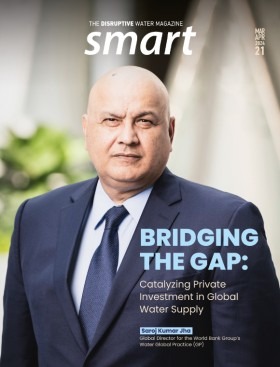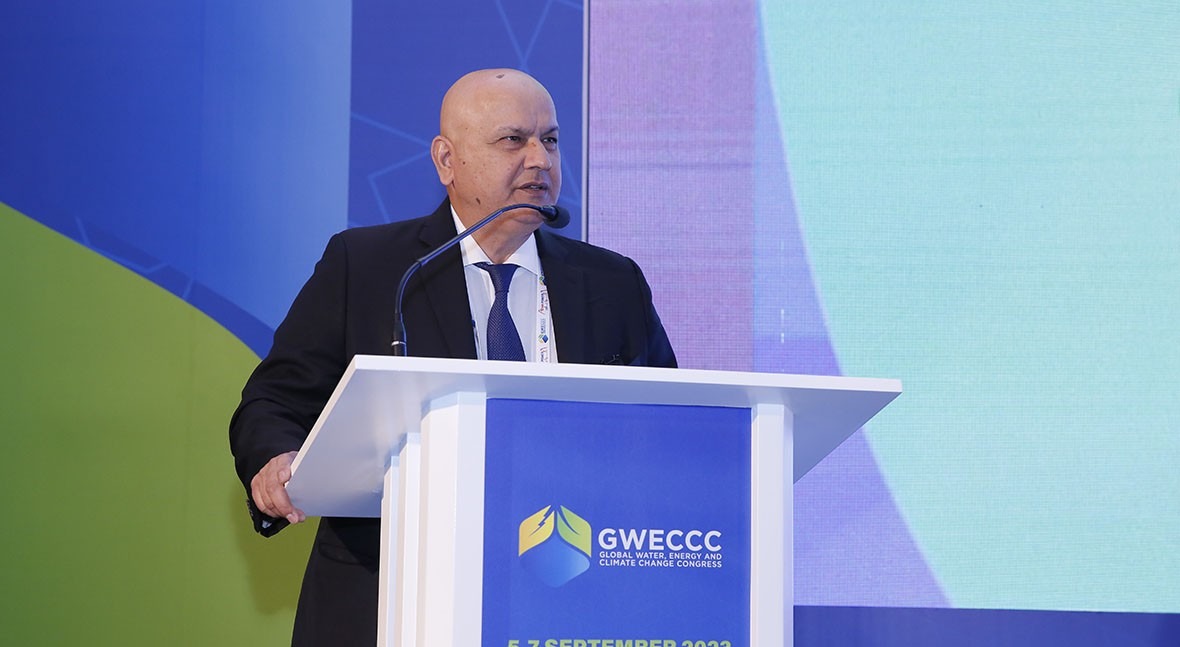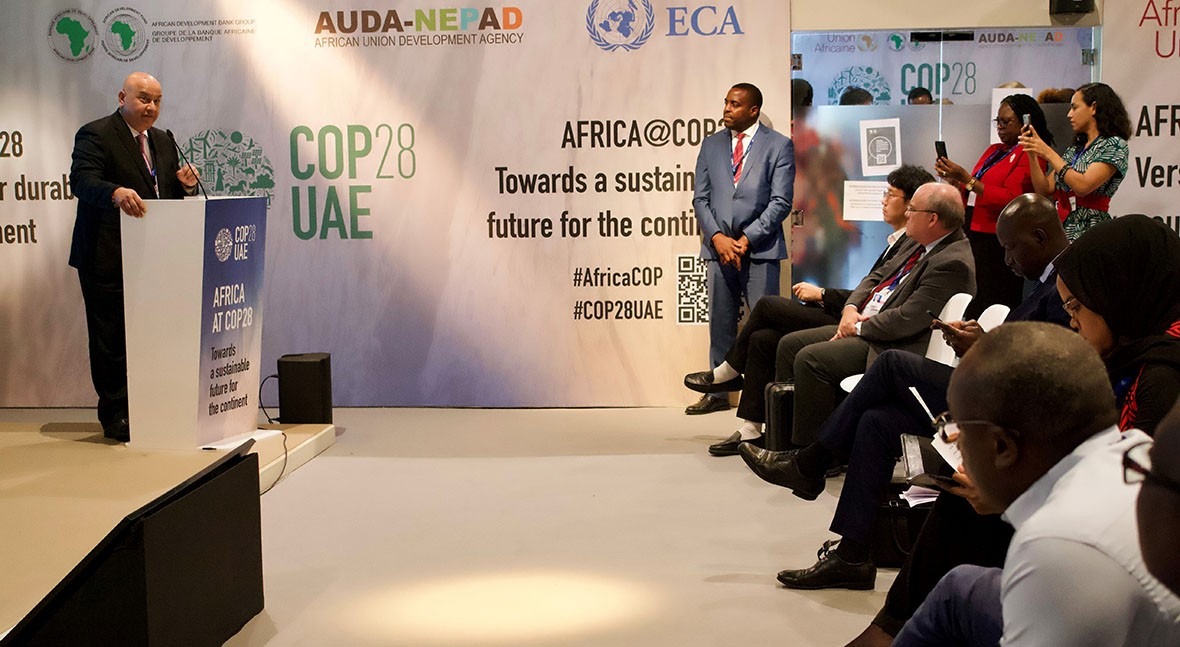“More private investment is needed to meet people's water needs"

The World Bank is currently the largest multilateral financier dedicated to water initiatives in developing nations. In 2023, the global organization successfully extended access to water or sanitation to nearly 30 million individuals by providing financial aid and technical assistance to governments for enhancing water infrastructure, management practices, and fostering community involvement.
With a robust portfolio of nearly US$30 billion in water-related investments and leading a team of over 400 people, Mr Saroj Kumar Jha, Director of the World Bank Group’s Water Global Practice, is a pivotal figure in shaping policy direction and fostering partnerships to address global water challenges. In this interview, we delve into his journey and insights into how the World Bank is navigating the complex landscape of water security and inclusive service delivery.
Can you tell us briefly about your career path and your current role at the World Bank Group?
I have always worked to improve the lives of poor people, especially those who live in fragile settings and are struggling to find clean water, sanitation, food, or good jobs to provide for their families. I began my career with the Government of India and then worked at the United Nations, where I focused on infrastructure financing, natural resources management, natural disaster prevention, and environmental sustainability.
I have had the privilege to work at the World Bank for nearly 20 years, and it has been incredibly rewarding. I have been stationed in the Middle East and Central Asia and served as the Senior Director of the Fragility, Conflict, and Violence Global Practice. I also founded and led the Global Facility for Disaster Reduction and Recovery, which is a multi-donor partnership that supports developing countries to understand, manage, and reduce their risks from natural hazards and climate change. Climate change, of course, shows up through water — whether it’s too much or too little. Nine of every 10 natural disasters are water-related.
That’s why I was so honored to be named the Global Director of the Water Global Practice in August of 2022. I lead a terrific team of over 400 staff, who are working hard to solve the water crisis, which is central to fulfilling the World Bank’s mission of creating a world free of poverty on a livable planet.
With only seven years left to achieve the Sustainable Development Goals, the world is significantly lagging behind, particularly on its water goals. How is the World Bank addressing the challenge of achieving water security?
It will be impossible to achieve all the Sustainable Development Goals without providing clean water and sanitation to everyone, so failure on water is not an option. To achieve SDG 6, the Water Global Practice focuses on enhancing investments, institutions, and information in the countries we support.
We have a portfolio of US$28 billion in water-related investments, analytical work, multi-donor trust funds, and global partnerships, which makes us the largest multilateral financier of water in developing countries. Last year, we provided access to water or sanitation to nearly 30 million people. But the needs are vast — 2 billion people lack safely managed drinking water services, 3.6 billion lack safely managed sanitation services, and 2.3 billion lack basic handwashing facilities. We must catalyze far more private investment because government funding — the source of the vast majority of water spending — doesn’t come close to meeting people’s water needs.
It will be impossible to achieve all the SDGs without providing clean water and sanitation to everyone, so failure on water is not an option
To create an enabling environment to encourage private investments, the World Bank is working to build strong, financially viable institutions — from water utilities to irrigation operators — to deliver services to communities. We are also strengthening government water ministries so that they can develop the right kinds of policies and regulations to govern the sector and make it more attractive to private finance.
In addition, because access to safe and clean water is critical to achieving other development goals, sectors need to work together. The World Bank enables a multisectoral approach by helping governments build data and information platforms for collaboration. This also fosters partnerships with academia, think tanks, international donors, and other countries, which is so important because water resources often cross borders.
Lastly, we are mobilizing and scaling up support for water through our new Fast Track Water Security and Climate Adaptation Global Challenge Program. It aims to strengthen water security through systems change and more sustainable water management and disaster risk reduction solutions. The program will enhance access to water supply and sanitation, improve irrigation service delivery and water productivity, and reduce flood and drought risk.

We have a portfolio of US$28 bn in water-related investments, making us the largest multilateral financier of water in developing countries
How does the 2030 Water Resource Group (2030 WRG) updated strategy promote the development of water security and climate action plans?
The 2030 Water Resources Group promotes the role of the private sector in water security and climate action through partnership and technical assistance. The challenges in the water sector cannot be solved by the public sector alone, and 2030 WRG looks for opportunities where multi-stakeholder partnerships and private sector innovations can improve water security.
2030 WRG’s work is structured along three themes, namely: (1) Water for Food, in particular through climate-resilient irrigation, (2) Water for the Environment, to address water pollution and water use for catchment protection and restoration, and (3) Water for Cities, to support resilient city-regional water systems, balancing the demand and supply of water. Each of these themes links with water security and climate action.
The World Bank enables a multisectoral approach by helping governments build data and information platforms for collaboration
Across these themes, 2030 WRG’s approach to country-level impact on water security and climate action is structured along four areas:
- Support for evidence-based decision-making through analytics and a macro framing of the national or sub-national/ state-level water challenges, building on World Bank and other analytics,
- Establishment of country platforms for high-level convening of government stakeholders, private sector, civil society, and international organizations,
- Design of Accelerator programs for large-scale implementation of private sector-led solutions, including private capital, innovation, and expertise, and
- Replication and scale up of successful solutions, particularly combining the World Bank’s institutional strengths in lending and public sector delivery with 2030 WRG’s pioneering public-private model of engagement.
In fiscal year 2023 (FY23), we launched accelerators in India, Bangladesh, South Africa, and Kenya, along with early work in Ethiopia and Kazakhstan. These accelerators are structuring innovative partnerships and solutions for systems change in the water sector.
In addition, our work to address water challenges became more climate-oriented than ever before. Water is at the center of the climate crisis: climate change is severely disrupting the water cycle on which people and the planet depend, and nine out of 10 climate events are water-related. For example, through our work in Uttar Pradesh, India, we are supporting farmers on climate-smart agriculture, contributing to greater water use efficiency, along with reduced methane emissions.
Fulfilling global water financing requirements is a substantial challenge, with an estimated $6.7 trillion by 2030 for water infrastructure. How is the World Bank promoting the need for financing, particularly in low-and middle-income countries?
Water is at the center of the climate crisis: climate change is severely disrupting the water cycle on which people and the planet depend
The World Bank is scaling up finance for water-related investments in emerging economies by leveraging limited concessional resources from donors to crowd in additional private sector innovation, expertise, and capital into a sector that has been historically funded through public and concessional financing.
We do this in several ways. First, we create the enabling conditions for scaling up finance through reforms, regulations, incentives, and capacity building, focused on the foundational issues of creditworthiness and technical and financial performance of service providers. Second, we mobilize private-sector participation through public-private partnerships, performance- and output-based contracts, results-based financing, and other instruments to improve operational efficiency and financial viability. Third, we diversify and expand the range of financial solutions from different partners and investors for countries, including commercial debt, bonds, microfinance, blended finance, and equity instruments through de-risking, credit enhancement, financial structuring, and overall sector sustainability initiatives. Lastly, we are emphasizing the linkages of water with climate mitigation and adaptation, both to strengthen the business case for water sector investments, as well as to leverage greater climate finance for the water sector.
The World Bank’s approach to increasing investments in the sector is encapsulated in a recent strategic framework on “Scaling up Finance for Water”.
Desalination has become a viable option to close a water supply-demand gap; however, governance structures established for conventional water sources are facing challenges in keeping pace. How is the World Bank aiding in this respect?
Unconventional water sources, such as desalination and recycled water, provide a weatherproof source of water that, when added in the right amount to the mix, can contribute to dealing with climate uncertainty and improve the reliability of the system. However, in the case of desalination volumes mobilized cannot be increased indefinitely without creating environmental and fiscal concerns. The use of desalination as a water augmentation and diversification strategy should come with significant efforts to improve water distribution and use efficiency and to reallocate scarce resources to activities with higher social and economic value. Desalinated water is also more expensive to mobilize than conventional sources, and this means that mainstreaming its use requires rethinking financial policies to ensure the long-term sustainability of the sector.
First of all, we need to put demand management measures in place, including reducing losses in water distribution systems and creating incentives for conservation through pricing policies, accompanied by subsidies to protect the poor from higher costs of the more expensive unconventional water sources as well as behavioral change to induce a reduction in water consumption.
World Bank has established a Desalination Community of Practice, aiming to generate, capture and disseminate knowledge on desal governance
Also, importantly, water rights regimes and environmental and water sector economic policies and regulations should be adapted to ensure a healthy and sustainable use of desalination as it increases its weight in the water mix. Likewise, if desalination and reuse are to be mainstreamed, this requires developing the institutional capacity to develop and manage sophisticated infrastructure in a rapidly evolving technological sector. It also requires institutions able to manage all the policy implications mentioned above.
In response to this need, the Bank has established a Desalination Community of Practice that aims at generating, capturing and disseminating knowledge on desalination governance and economics among WBG institutions and clients, partnering with countries that are ahead of the curve in this domain and with the industry.
Reclaiming and reusing water is also central to a water-secure future. How is the World Bank promoting a circular economy? And do you have any projects you are particularly proud of?
Wastewater reuse involves treating and recycling water that would otherwise be discharged into the environment, reducing the pollution load on water bodies and it is often more cost-effective than desalination and other unconventional water supply alternatives, especially in areas where the infrastructure for wastewater treatment already exists. To accelerate the consideration of water in circular economy efforts, the World Bank has developed the Water in Circular Economy and Resilience (WICER) Framework to guide practitioners who are incorporating the principles into policies and strategies, planning, investment prioritization, and design and operations. The framework has assisted projects at the global level in integrating circularity into their designs.
Nowadays technology is moving at a very high pace, but the water sector has been risk-averse and slow to adopt and disseminate new technologies
In water-stressed Tunisia for example, the World Bank’s sanitation engagement was key in supporting increased reuse of treated wastewater in agriculture, and piping wastewater under land and sea as part of an environmentally safe disposal system. This reduced wastewater discharge from Greater Tunis into the Gulf of Tunis, an environmentally sensitive area of the Mediterranean.
Another example is the Water Circularity and Efficiency Improvement Project in Türkiye, a country where over two-thirds of 25 river basins are facing water scarcity and widespread wastewater pollution is deteriorating water quality. This $434.7 million project approved by the Bank in 2023 will improve wastewater and reuse services, increase irrigation services and efficiency, and strengthen institutional capacity and coordination for managing water circularity.
In a recent blog post, you mentioned that to address the water crisis at scale, unconventional methods and new and disruptive forms of financing are needed. In what ways can emerging technologies also assist the water sector?
Nowadays technology is moving at a very high pace, but the water sector has been risk-averse and slow to adopt and disseminate new technologies. Recent data from our Digital Maturity Global Survey has found that less than 10% of water utilities in low- and middle-income countries are using artificial intelligence, big data analytics or digital twins. We have seen advances in sensor technology, computing, artificial intelligence, and big data management, which can help improve the monitoring of water quantity and quality and inform operational decisions by policymakers and water companies, amongst other key capacities.

To accelerate the uptake of technology and hit our stride, we need to do three things: first, create an enabling environment of policies, incentives, and regulations that not only promote the adoption of existing technologies, but also seek to accelerate, scale up and catalyze our adaptation to the new challenges we are facing; second, by financing more innovation to develop and scale new technological solutions, with a clear indication of the potential returns on investment; and, third, invest in continuous learning and development for our staff and the water companies we work with, to keep up with technological developments.
What role does the World Bank play in promoting best practices, knowledge sharing and capacity building among nations to strengthen their water governance and management capacities?
Generating knowledge and enhancing capacity are essential elements of the World Bank’s approach to solving multiple crises. An example is our Global Water Security and Sanitation Partnership (GWSP), which is a multi-donor fund that produces cutting-edge research and analytics to create and deliver urgent, practical, and innovative solutions to enhance water security. It’s a kind of action-oriented think tank for the water sector, providing clients with policy advice, technical assistance, capacity building and turning knowledge into action through policy dialogue and lending operations.
For example, in fiscal year 2023, GWSP provided support to 26 Country Climate and Developments Reports by analyzing the impact of water-related risks on economic growth and livelihoods. In Argentina, a GWSP-supported program aims to reduce flood exposure for 123,000 people and support 10 cities in adopting improved integrated urban flood risk management practices. And in Cambodia, GWSP funded the development of a water resource modeling tool that generates climate change scenario projections, including risks of water shortages, to inform coordination between the country’s water resource and supply sectors.






